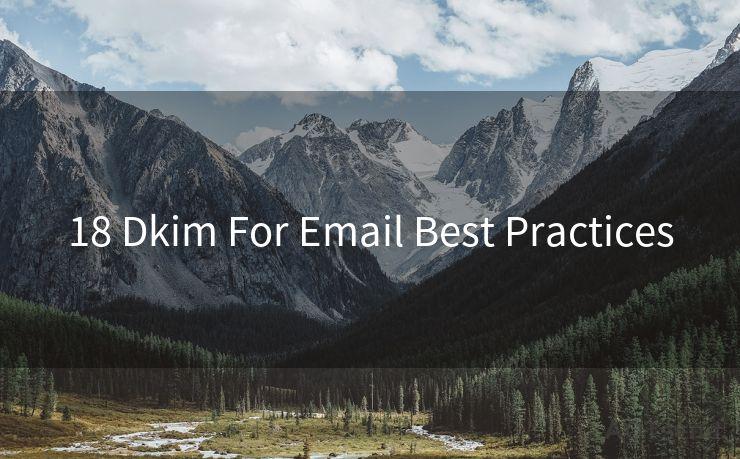18 Dkim For Email Best Practices




Email marketing remains a powerful tool for businesses to reach their customers. However, with the increasing threat of spam and phishing emails, it's crucial to ensure your emails are authenticated and trusted. That's where DKIM (DomainKeys Identified Mail) comes into play. DKIM is an email authentication technique that allows the receiver to verify that an email was indeed sent by the domain it claims to be from.
In this article, we'll explore 18 best practices for implementing DKIM for email to enhance your email deliverability and improve your SEO ranking on Google.
1. Understanding DKIM
DKIM works by adding a digital signature to the email's header. This signature can be verified by the receiving server, confirming the email's authenticity. It's a crucial step in fighting spam and email fraud.
2. Implementing DKIM
To implement DKIM, you need to generate a public-private key pair. The private key is used to sign outgoing emails, while the public key is published in your domain's DNS records.
3. Choosing the Right Selector
The selector is part of the DKIM signature that identifies the key used to sign the message. Choose a unique and descriptive selector for each key pair.
4. Keeping Keys Secure
Protect your private keys. Don't share them with unauthorized individuals, and consider using a secure key management system.
5. Regular Key Rotation
Rotate your DKIM keys periodically to maintain security. This involves generating new key pairs and updating your DNS records.
6. DNS Record Accuracy
Ensure your DNS records are accurately configured. Any mistakes can lead to DKIM verification failures.
7. Testing DKIM Implementation
Use online tools to test your DKIM implementation. Send test emails and check if they pass DKIM verification.

8. Monitoring DKIM Status
Regularly monitor your DKIM status to ensure it's working correctly. Look for any issues that might affect email deliverability.
9. Compatibility with Other Authentication Methods
DKIM works best when combined with other email authentication methods like SPF (Sender Policy Framework) and DMARC (Domain-based Message Authentication, Reporting, and Conformance).
10. Improving Email Deliverability
With DKIM, your emails are more likely to reach the inbox instead of being marked as spam. This enhances your email marketing efforts.
11. Protecting Your Brand Reputation
DKIM helps protect your brand's reputation by ensuring that spoofed or fraudulent emails don't originate from your domain.
12. Enhancing Customer Trust
Customers are more likely to trust emails that pass DKIM verification, leading to higher engagement and conversion rates.
13. StayingCompliant with Email Standards
DKIM is becoming a standard for email authentication. Implementing it helps you stay compliant with evolving email standards.
14. Troubleshooting DKIM Issues
If you encounter DKIM verification failures, troubleshoot promptly. Check your DNS records, key configuration, and email headers.
15. Educating Your Team
Ensure your team understands DKIM and its importance. Train them on best practices for managing and troubleshooting DKIM issues.
16. Leveraging DKIM for SEO
While DKIM directly impacts email deliverability, it indirectly benefits your SEO efforts. Higher email engagement can lead to more traffic to your website, improving your Google ranking.
17. Staying Updated on DKIM Developments
Follow industry news and updates on DKIM to stay informed about any changes or improvements.
18. Partnering with Experts
Consider partnering with email marketing or SEO experts who can help you optimize your DKIM implementation for maximum effectiveness.
By following these 18 best practices for DKIM in email, you can significantly improve your email deliverability, enhance customer trust, and indirectly boost your SEO ranking on Google. DKIM is a powerful tool in your email marketing arsenal, so make sure you're using it to its full potential.
🔔🔔🔔
【AOTsend Email API】:AOTsend is a Managed Email Service for sending transactional emails. Support Email Types: reminders, authentication, confirmations, notifications, verification codes, invoices, password resets, account activations, billing statements, two-factor authentication (2FA), and one-time passwords (OTP) emails, etc. $0.28 per 1000 Emails. 99% Delivery, 98% Inbox Rate.
You might be interested in:
Why did we start the AOTsend project, Brand Story?
What is a Managed Email API, How it Works?
Best 25+ Email Marketing Platforms (Authority,Keywords&Traffic Comparison)
Best 24+ Email Marketing Service (Price, Pros&Cons Comparison)
Email APIs vs SMTP: How they Works, Any Difference?




Scan the QR code to access on your mobile device.
Copyright notice: This article is published by AotSend. Reproduction requires attribution.
Article Link:https://www.mailwot.com/p4823.html



